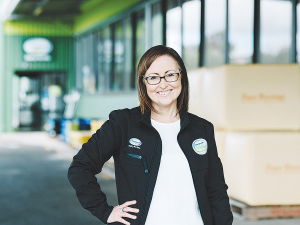Battle for milk
OPINION: Fonterra may be on the verge of selling its consumer business in New Zealand, but the co-operative is not keen on giving any ground to its competitors in the country.
 Anne Douglas says the co-op’s manufacturing team remains confident that product quality will not be impacted by the suspension of minor downgrades.
Anne Douglas says the co-op’s manufacturing team remains confident that product quality will not be impacted by the suspension of minor downgrades.
Fonterra is no longer docking farmer milk cheques for minor milk quality downgrades, within the Fat Evaluation Index (FEI) grading system, until further notice.
The co-operative says this is to help cashstrapped farmers, who are also facing feed shortages. This means Fonterra farmers can bring average feed costs down by including a bit more palm kernel expeller (PKE), which can impact milk fat composition and previously risked penalties. However, the co-op has asked farmers to be prudent in their use of PKE.
In an email to farmer shareholders two weeks ago, Fonterra Farm Source group director Anne Douglas says the suspension of minor downgrades will remain in place for as long as overall Fat Evaluation Index (FEI) levels are at a manageable level. She said Fonterra’s manufacturing team remains confident that product quality is not being impacted.
Fonterra introduced the FEI grading system in 2018, saying it would help farmers supply milk with the right fat composition. It said this was done to ensure that the co-op can continue to manufacture products that meet customer specifications and provide the best return to farmers.
A minor downgrade is the first step in the milk quality framework for milk that doesn’t meet Fonterra Farmers’ Terms of Supply.
The first two minors incurred in a month do not incur a financial deduction, but any subsequent minors attract a 5% deduction from the milk payment for that day.
For FEI a minor downgrade is a result between 9.01 - 11 (category C), incurring a 5% deduction. A major downgrade is between 11.01 – 16 (category D), incurring a 20% deduction.
Any results over 16.01 are given a reject milk quality rating.
The FEI downgrade system involves two tests: A rapid low-cost screen provides daily results to the farmer. The confirmatory test is more precise and is used to confirm downgrades.
Fonterra says there will be no confirmatory testing for category C results until further notice.
“We’ve made the decision due to several factors, but most significantly because of the ongoing adverse climatic conditions across the country,” Douglas explained. “The reduced level of feed availability resulting from these conditions and the economic conditions on farm.”
She says Fonterra is confident that the changes won’t impact product quality right now.
Fonterra has also undertaken to provide shareholders at least seven days’ notice before reintroducing minor downgrades.
The World Wide Sires National All Day Breeds Best Youth Camp Best All Rounder plaudit has become family affair, with 2026 Paramount Cup winner Holly Williams following in her sister Zara's footsteps.
DairyNZ is giving New Zealand farmers a unique opportunity to gain hands-on governance and leadership experience within the dairy sector.
Herd improvement company LIC has posted a 5.2% lift in half-year revenue, thanks to increasing demand for genetics.
According to the latest Fresh Produce Trend Report from United Fresh, 2026 will be a year where fruit and vegetables are shaped by cost pressures, rapid digital adoption, and a renewed focus on wellbeing at home.
The Roar is a highlight of the game hunting calendar in New Zealand, with thousands of hunters set to head for the hills to hunt male stags during March and April.
OPINION: The past few weeks have been tough on farms across the North Island: floods and storms have caused damage and disruption to families and businesses.